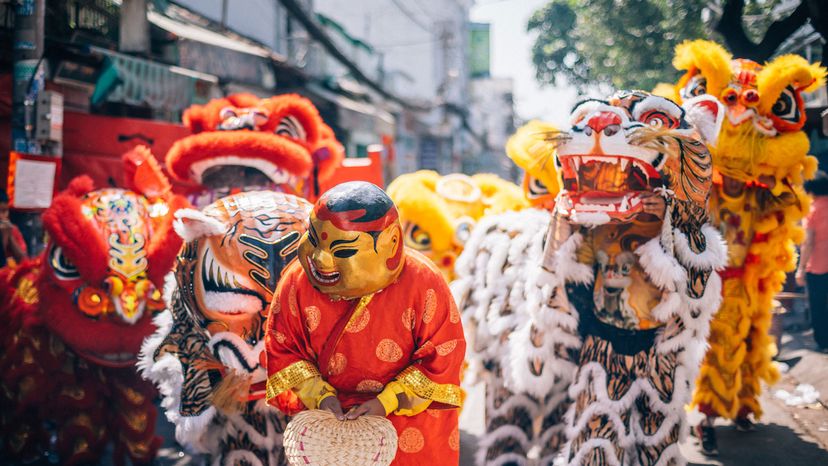The Days of Chinese New Year

Preparations for Chinese or Lunar New Year begin about a week in advance. For example, foods have to be prepared ahead of time, because traditionally, no cooking takes place during the first five days of the New Year. The week prior to the celebration is also a time to buy gifts and to prepare decorations. But the most important step in getting ready for New Year is cleaning the house. The custom is to sweep dust to the middle of room and out the back door, which symbolizes sweeping away bad luck. Residents of a home sometimes clean and paint doorways and windows to welcome good luck in [source: Roth].
If possible, all who owe money try to settle their debts before the New Year. Chinese companies often give New Year bonuses -- a month's wages is typical -- so that workers can pay off debts and have money to buy gifts and food [source: Welch]. This is also a traditional time to symbolically send the Kitchen God to heaven. This domestic deity, represented by a paper image, is burned in order to carry information about the family to the Taoist god known as the Jade Emperor [source: Rabkin].
Advertisement
On New Year's Eve, Chinese families traditionally gather for a large meal. They stay up late in order to welcome the New Year at midnight. The next day, the first day of the 15-day celebration, is generally a quiet day in China. The cooking and cleaning have already been done, and most people stay at home or pay visits to friends.
When out visiting, many Chinese bring small gifts, and hosts offer tea. Everyone exchanges greetings and wishes of good luck and prosperity for the coming year. An example of a traditional greeting is, "Congratulations and be prosperous," but many people who meet just wish each other Happy New Year [source: Wertz]. On the third day, it's common to visit graves in order to pay respects to relatives who've passed away. On the fifth day, the taboos against cleaning and cooking traditionally end. Visits are usually not made on this day, which is when prosperity is said to come down from heaven. The seventh day of New Year is known as the Universal Birthday of humans. Traditionally, it's the time when people add one year to their age.
By this point, most Chinese have returned to their jobs and regular lives, but there's one more celebration in store. It happens on the 15th day, the first full moon of the year. Known as the Lantern Festival, it's celebrated with parades, dances and, of course, displays of all kinds of lanterns. This is when you're likely to see a dragon dance, with chains of performers snaking through the streets under a cloth or paper dragon costume. In China, the dragon is a symbol of prosperity and luck and the dance is a final attempt to attract good luck for the coming year. The largest dragon dance outside of Asia takes place in San Francisco's Chinatown [source: Welch].
New Year is above all a family holiday. In the next section, we'll look at the traditional way families celebrate together.